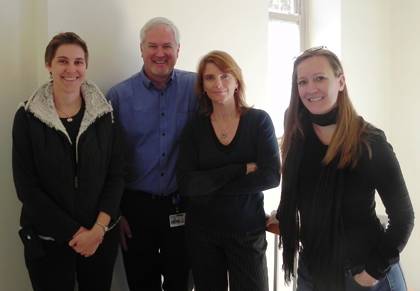Earning 'Green Workplace Certification'
Five Duke units go green, gain special recognition

Kathy Kay greeted conference attendees as she stood by receptacles in front of a large "TRASH" sign.
"Let me take that," said Kay, taking a box that contained the remains of lunch.
Read MoreShe separated items from the box, placing the empty chip bag in the trash, tossing a plastic cup and utensils into a recycling bin and piling food scraps and compostable paper products into another bin.
"We tried just leaving up signs, but we found people don't always take time to follow instructions," said Kay, assistant manager for special events at the Pratt School of Engineering.
Kay works in the Dean's Office at Pratt, which hand-sorts trash at events as part of its commitment to sustainability. The office also purchases recycled office supplies and enables energy-saving printer settings.
These practices helped the office become the first unit at Duke to receive certification as a Duke Green Workplace in September. Since then, four other units have received certification: Fitzpatrick Institute for Photonics, Office of Sustainability, the 8100 General Medicine Stepdown unit at Duke University Hospital and the Duke Carbon Offsets Initiative office.
The Green Workplace Certification recognizes work areas that formally assess how they are reducing their environmental footprint. Duke's Office of Sustainability administers the process, which begins when a representative from a work area attends the free "Leading for Environmental Sustainability" workshop. As part of the workshop, participants receive a checklist of sustainable practices ranging from double-sided printing to using eco-friendly dishwashing soap in a break room. A work area that can demonstrate it follows at least 40 of the checklist's 57 items can apply for certification and permission to post the Duke Green Workplace seal in its office and on materials.
The Dean's Office at Pratt turned the checklist into an online survey for its 34 employees and color-coded the answers as they came in - red for not practicing, green for yes. "It was quite clear that we would easily surpass the requirement of 40 practices," Kay said. "The answer sheet was a sea of green."
With 46 of the 57 practices firmly under its belt, the Dean's Office completed the application and received its Duke Green Workplace seal in September. The office will survey itself again before the end of the academic year to track improvement in areas such as encouraging use of public transportation and reusable mugs.
For the Fitzpatrick Institute for Photonics, which answered yes to 52 of the 57 practices, the use of reusable mugs has been a success. Faculty, staff and students who attend weekly research meetings must now bring a mug for free coffee. "It's our way of helping people make a lifestyle change," said August Burns, business manager for the institute.
At Duke University Hospital, the 8100 patient care unit is the first Duke University Health System area to receive certification. The unit worked closely with the Sustainability Office to modify the checklist to reflect the healthcare environment. The unit added practices such as turning off faucets during patient baths and creating reusable signs for patient room doors.
"We've worked hard to integrate sustainability into our work," said Amy Lett, a registered nurse who led the 8100 Green Team. "There was a lot of pride and excitement on the unit when I sent around the congratulatory note saying we had received the certification."
According to Casey Roe, outreach coordinator for Sustainable Duke, interest in workplace sustainability has grown quickly at Duke. Just under 100 employees have taken advantage of the free "Leading for Environmental Sustainability" workshop since January 2011, when it was first offered.
"Duke is committed to being carbon neutral by 2024, but a lot of the change will have to come from students, faculty and staff," Roe said. "The Green Workplace Certification helps us recognize those efforts."